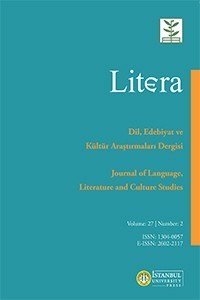Obscene and Offensive Language in La Voyeuse Interdite by N. Bouraoui and C’est le soleil qui m’a brûlée by C. Beyala
Sexuality is a very popular theme in African literature in general. Strongly linked to other themes like patriarchy, female emancipation, male domination, etc., sexuality translates the gender conflict in women and men and betrays male ideology in African societies. Sexuality in the corpus chosen for our study: C’est le soleil qui m’a brûlée by Calixthe Beyala and La Voyeuse interdite by Nina Bouraoui, is intimately linked to the writing project of these authors who chose to opt for obscene language and insults in order to show to what extent man reduces woman to a simple sexual object and in order to adopt a position of counterattack in the concern to reduce man to his sexual organ. Obscene language then becomes a means of proclaiming the freedom of women. The authors also use this shocking language to awaken readers’ awareness of the urgent need to establish a balance in the relationship between women and men. Reading the obscene and offensive anguage throughout the two African novels submitted for study will allow us to see how the authors portray sexual scenes without retouching and constantly put them back into their ideological and social framework.
Keywords:
Language, sexuality, triviality Beyala, Bouraoui,
___
- Althusser, L. (1976). Positions. Paris : Les Editions sociales. google scholar
- Althusser, L. (1976). « Ideologie et appareils ideologiques d’Etat » in Positions. google scholar
- Austin, J. L. (1991). Quand dire c’est faire. Paris : Seuil. google scholar
- Beyala, C. (1999). Cest le soleil qui m'a brûlee. Paris : J’ai lu. google scholar
- Bouraoui, N. (1999). La Voyeuse interdite. Paris : Gallimard. google scholar
- Butler, J. (2006). Le Pouvoir des mots. Paris : Editions Amsterdam. google scholar
- Felman, S. (1976). La Folie et la chose litteraire. Paris : Seuil. google scholar
- Foucault, M. (1975). Surveiller et punir. Paris : Gallimard. google scholar
- Guiraud, P. (1978). Dictionnaire historique, stylistique, rhetorique et etymologique de la litterature erotique. Paris : Payot. google scholar
- Rastier, F. (1987). Semantique interpretative. Paris : PUF. google scholar
- Saıgh Bousta, R. (1989). « Polysemie et motricite discursive:pour une lecture de Harrouda », in Nouvelles duSud, n°11, Silex, mai-juin. google scholar
- Yaguello, M. (1998). Les Mots et les femmes, Essai d’approche sociolinguistique de la condition feminine. Paris : Payot. google scholar
- Başlangıç: 1954
- Yayıncı: İstanbul Üniversitesi
